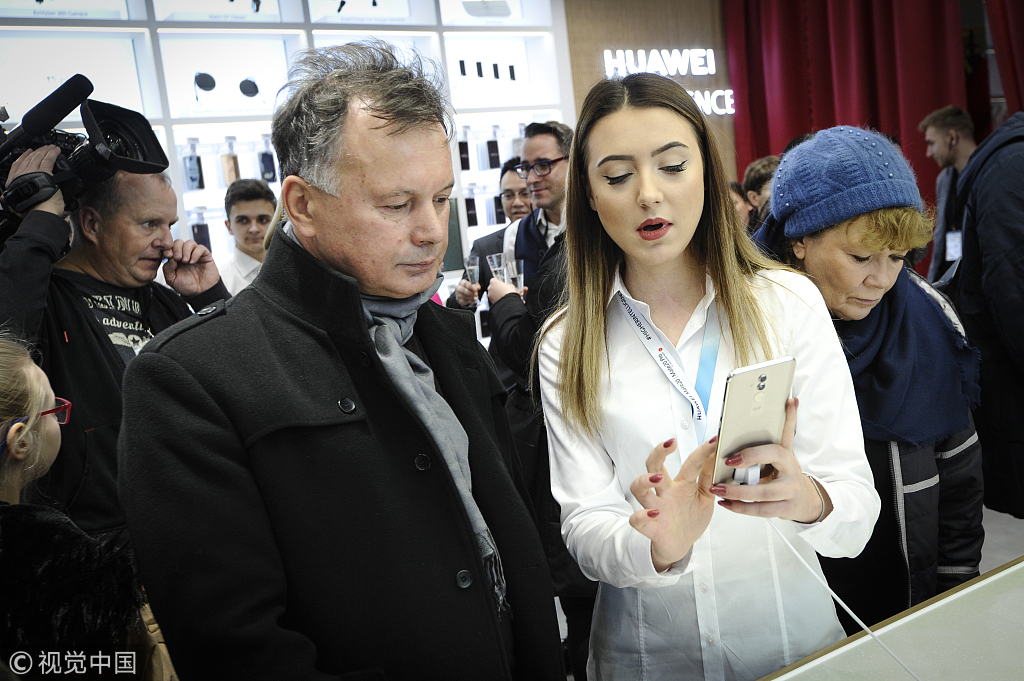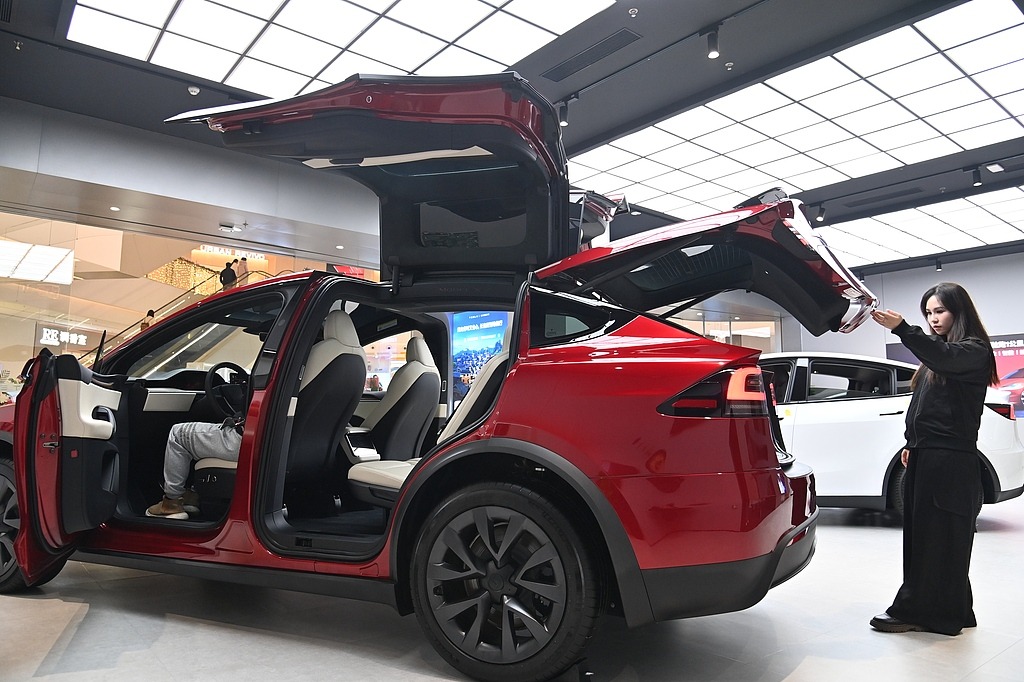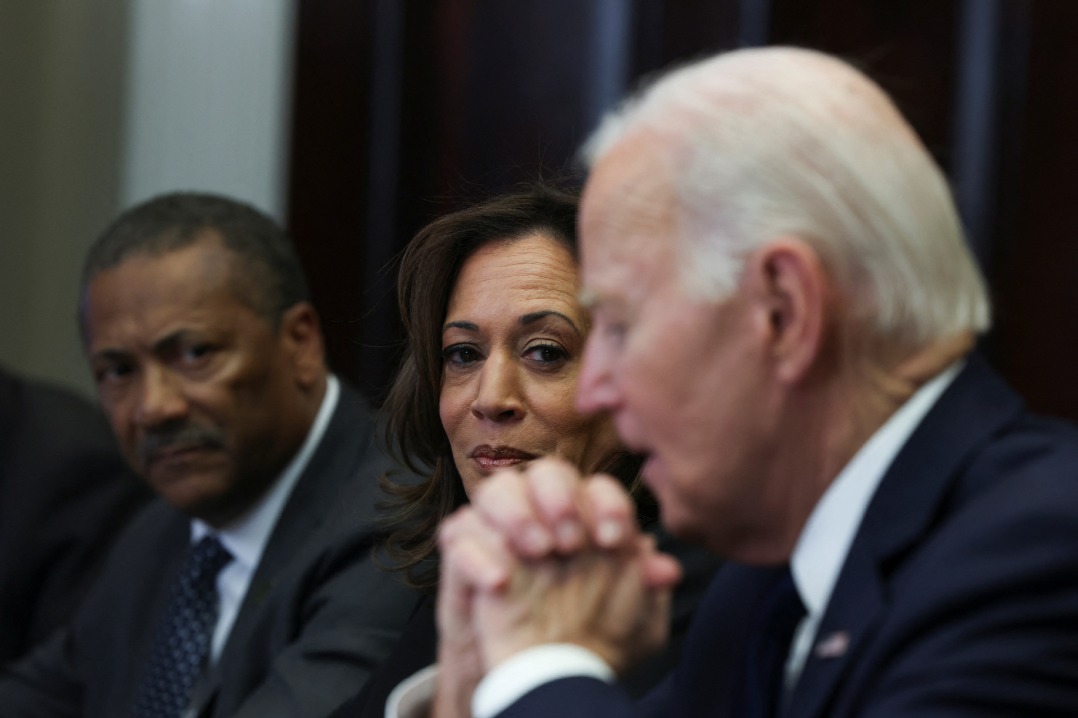Huawei's rotating chairman Ken Hu speaks to global media
chinadaily.com.cn | Updated: 2018-12-26 11:37

Huawei representatives and guests are seen at the festive opening of the first Huawei store in the country on Dec 15, 2018 in Warsaw, Poland. [Photo/VCG]
Shunsuke Tabeta, Nikkei: You talked about the Security Transparency Center as an upcoming initiative taken in Europe. Do you have similar measures in Japan, or Asia, or Australia on security?
Ken: On security, we are very willing to take proactive measures to address and mitigate concerns. This is our principle. Under this principle, we stay open to have proactive dialogue with governments around the world, to understand their concerns and to explore all possible solutions.
We have already had many successful cases in countries like the UK, Canada, Germany and France. And definitely the APEC region is not an exception. We’ve also proactively communicated with regulators in those countries. We’ll be looking at their needs and requirements and explore the right solutions to address those recent requirements.
Joe McDonald, AP: Some people suggest that governments such as the US that say Huawei is a security risk really aren’t concerned about security but about trade and are trying to stop Huawei from becoming a competitor with American technology companies. First I want to ask, do you think that’s the case, that governments are creating this as a competitive issue to stop Huawei?
Second how much do you think this might hurt Huawei’s business?
How do you feel about being labelled a security risk?
What do you want to see changes in trade between China and the United States or China and other countries to help you?
Ken: First, labelling Huawei as a security risk. Our opinion is that any conclusion, any speculation should be based on real evidence.
Either you have evidence to show that Huawei’s solution or Huawei’s equipment is not secure.
Over the past 30 years, hundreds of telecom operators have used Huawei’s equipment. There has been no major cybersecurity incidents. And there has been almost zero Huawei equipment being used in the United States, so what is the evidence here to say that Huawei is not secure?
Or either you say there are problems with Huawei’s behavior, yet again, over the past 30 years we have become a $100-billion-dollar company with business in 170 countries. There’s no evidence to show Huawei has problems with our behavior.
So the question I want to ask is for a company with a 100 billion dollars in revenue, with businesses in 170 countries, with the fact that we’ve provided leading products to most telecom operators around the world, we serve hundreds of Fortune 500 companies, we also serve hundreds of millions of consumers around the world – you say Huawei is a cybersecurity risk without any proof. On what grounds?
You also talked about competition.
If you look at advancement in human society from a technology and innovation point of view, a very big driver is the benign competition between different industries and between different companies.
With absence of competition consumers cannot enjoy better technologies in a shorter period of time.
We also believe leadership can only be gained through competition.
Locking competitors out of the field cannot make yourself more excellent.
Therefore we believe any concern, any allegation or suspicion on security about Huawei, should be based on factual evidence. Without factual evidence we don’t accept and we oppose those allegations.
For 5G technology that is about to be deployed, Huawei has the strongest leadership position in this area.
Leading companies need to be respected and encouraged. Because we bring benign competition and drive the healthy development of the industry. And in the end the entire society will benefit.
Dan Strumpf, WSJ: Thank you for taking this press conference. As you know much of the recent efforts against Huawei over the last year in many western ally countries around the world have been led by the United States and by the United States security establishment and it has been well-reported this is a coordinated effort. It’s been the 6 years since the American government first raised its security concerns about Huawei. And the company finds itself in this position now 6 years later defending itself against the very same allegations. I am just wondering if you believe, if Huawei believes that it could have done anything differently over the last 6 years to communicate its position primarily to the United States but to governments that find it mistrustful, in particular governments that used to welcome Huawei but now find themselves less willing to accept its equipment as 5G rollout begins. Thank you.
Ken: Over the last couple of years, Huawei has taken many measures to engage in proactive communication with governments. On top of communication, we also established cooperation mechanisms on security with many national governments, including the governments of the UK, Canada, Germany, and France. We highly appreciate the open and pragmatic approach those governments have demonstrated in these engagements. And that progress has encouraged Huawei to do even better in those areas. This is the strategy and approach that Huawei will continue to follow.
At the same time, as I mentioned at the very beginning, we realize that as we grow bigger it is also part of our responsibility to proactively communicate and collaborate with the governments around the world. Because naturally, big companies draw more attention and also more concerns. Therefore, as we grow bigger, we will continue to embrace openness and transparency, communicating with all these stakeholders to address and mitigate their concerns.
Tony Chan-Commsday: Hi. I have a couple of questions specific to Australia. I just want to know the numbers you've quoted about the cost of rolling out base stations and wireless network regarding the cost of rolling that without Huawei that the numbers you gave before. Was that a Huawei study or a third-party research? And the other thing is obviously Huawei continues to engage the Australian government regarding the recent policy of banning Huawei from bidding for 5G. I just want to know if they actually express any detailed requirements for Huawei. Like, is there something that Huawei can do to actually qualify? Or is it just a blanket ban without particular details, technical details.
Ken: On the first question, the numbers that I shared with you earlier came from a third-party report. The name of the company is Frontier Economics. The title of that report is The Value of Competition on 5G Network Deployment. If you are interested, we can provide this report to all of you.
And then to your second question. It’s a pity that we haven’t got any clear message from the Australian government, saying what exactly the problem is, and what is the evidence for them to come to their conclusion. And we did not have the opportunity to clarify this doubt with the Australian government.
























